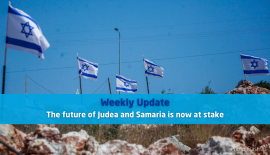Weekly Update: US and EU close to new nuclear deal with Iran – will it bring peace, or war?
Jesus warned that one of the signs of His coming again would be “wars and rumors of wars”. Are we witnessing fulfilment of that prophecy?
While there have always been wars, today many parts of the world are being shaken. The stabilizing influence of Western nations in the world is declining, and dictatorial regimes like those in Iran, Russia, China and Turkey are all creating, or threatening, military conflict to consolidate their hegemonic expansive ambitions.
Since WWII, the United States have been the global protectorate of Western values. For better or for worse, US presence in the Middle East ensured a kind of political stability. Over the past decade, however, the US has virtually withdrawn from the Middle East, leaving a vacuum. Together with Russia and Turkey, the revolutionary regime of Iran is seeking to fill that void. Since the 1979 revolution, the Shiite regime in Iran has built a network of proxies across the Middle East. Tehran has allies among more than a dozen major militias, some with their own political parties, that seek to overthrow local and neighboring governments. Iran’s Revolutionary Guards and the elite Qods Force provide arms, training and financial support to militias and political movements in at least six countries: Bahrain, Iraq, Lebanon, the Palestinian Territories, Syria and Yemen.
The Islamic Revolutionary Guard Corps (IRGC) is mandated by Iran’s constitution to pursue “an ideological mission of jihad in Allah’s way; that is extending sovereignty of Allah’s law throughout the world.” Since the inception of this paramilitary force in 1979, the Guard has emerged as the principal organisation driving the Iranian regime’s revolutionary Shia Islamist ideology, within and beyond the regime’s borders. For over 40 years, it has been linked to terrorist attacks, hostage-takings, maritime piracy, political assassinations, human rights violations globally, and the crushing of domestic dissent across Iran.
Iran is ideologically committed to Israel’s destruction (Iran refers to Israel as “the Little Satan”). Amongst other things, Iran has enabled its proxy Hezbollah to amass about 150,000 missiles on Israel’s northern border in Lebanon, directed against Israel. Hezbollah is the world’s most heavily armed non-state actor, and has been described as “a militia trained like an army and equipped like a state.”
But it is not just Israel. The threat presented by Iran’s aggressive activities in the region was one of the driving factors behind the growing coalition of Israel with moderate Sunni States. All feel threatened by the radical Shiite regime in Tehran. The most obvious fruit of this cooperation so far is the Abraham Accords signed in 2020 between Israel, the US and several Gulf States (UAE and Bahrain) plus Morocco and Sudan, as well as Israel’s increased military and security cooperation with Egypt, Jordan, and Saudi Arabia. Iran is widely recognized as threat number one to global peace.
For decades, Iran has been working on building a nuclear bomb. To meet this threat, in 2015 the Obama/Biden Administration, together with China, France, Russia, the United Kingdom, and Germany (the “P5+1”), entered into an agreement with Iran known as the JCPOA. The Trump Administration pulled out of the JCPOA in 2018.
This week, it has been reported that Iran is very close to closing a new deal with the P5+1 which will be a much weaker version of the JCPOA of 2015. Basically, the agreement lifts most of the sanctions on Iran (which were imposed after 1979), thus enabling hundreds of billions of dollars to flow again into Iran, in exchange for certain commitments by Iran to contain its nuclear program.
Some argue that such a deal is better than no deal, because it will delay or even possibly prevent Iran from reaching nuclear capability. Others argue that the only way to prevent Iran from creating and using nuclear weapons is by isolating the Iranian regime, maintaining economic sanctions, and presenting a credible threat of military action. This is Israel’s approach. Prime Minister Lapid said this week: “On the table right now is a bad deal. It would give Iran a hundred billion dollars a year. This money will not build schools or hospitals. This is a hundred billion dollars a year that will be used to undermine stability in the Middle East and spread terror around the globe.”
The Israeli government threatens to take whatever military action is necessary “to prevent Iran from becoming a nuclear state. We are not prepared to live with a nuclear threat above our heads from an extremist, violent Islamist regime. This will not happen. Because we will not let it happen.”
Former Israeli PM Netanyahu has been one of the most outspoken critics of the JCPOA. He points to three elements of the deal that are particularly problematic: it gives “hundreds of billions of dollars” to Iranian “terror”, it “gives Iran an advanced centrifuge network” with upgraded enrichment ability, and it creates what he calls “international immunity” for the Iranian nuclear program.
Israeli commentator Caroline Glick warns that Iran already has the capacity to build a nuclear bomb. “The nuclear deal Biden is now negotiating won’t push Iran’s nuclear genie back in the bottle. Iran will enter the deal – if it agrees – as a threshold nuclear state. And it will exit the deal as a nuclear power.”
Moreover, she warns, by giving in to Iran’s demands, the deal will usher in an era of global nuclear chaos: “The deal itself destroys the very concept of nuclear non-proliferation. Once Biden and Iran conclude their deal, the prospect of nuclear war will no longer be a distant if ever-present concern. It will become a certainty, as nation after nation rushes to acquire nuclear weapons.”
We are in unchartered territory. Agreement or no agreement, the regime in Iran is highly unlikely to abandon its ideologically-driven ambition to develop nuclear capacity. Israel may very well feel forced to take pre-emptive military action to take out Iran’s nuclear capabilities. If it does so, it will inevitably face international condemnation, and possible reprisal, which could spiral into a regional or global conflict.
These new developments may also trigger internal revolution or civil chaos in Iran, as internal opposition parties feel emboldened to confront the regime in Tehran.
What does all of this mean? As believers in the God of Abraham, Isaac and Jacob, we know that the time leading to the coming of Messiah will be one of great uncertainty and conflict. Equally, we see the restoration of the Jewish people to the land – the fig tree sprouting its leaves (Luke 21:30) – so we can be sure that the Lord’s coming is soon.
The Lord is preparing the nations, Israel and the church for the coming of Messiah. Our task is to be ready. Let us pray all the more fervently that – should the Jewish people again be threatened with annihilation – the Lord Himself will intervene to protect His people. There is no place for fear. “When these things begin to take place, stand up and lift up your heads, because your redemption is drawing near.”
The Editorial Team – Israel & Christians Today
Full text: Opening remarks by Lapid at briefing to foreign journalists on Iran nuclear talks
The following are remarks by Israeli Prime Minister Yair Lapid at the opening of a briefing on Wednesday for foreign correspondents that focused on the ongoing nuclear talks between Iran and world powers in Vienna.
Biden ushers in an era of nuclear chaos and war
Caroline Glick writes: “Unfortunately, appeasement of Iran is now a firm principle of identity politics and progressive dogma. And so, it continues and escalates.”
The Difference Remains | Romans 9-11 with Johannes Gerloff #60
Yes, we are part of the same tree. But, contrary to the vast majority of Christian believers, the Bible does not wipe away the decisive difference between Israel and the Gentile nations.
SCRIPTURE FOR THE WEEK:
25 “There will be signs in the sun, moon and stars. On the earth, nations will be in anguish and perplexity at the roaring and tossing of the sea.26 People will faint from terror, apprehensive of what is coming on the world, for the heavenly bodies will be shaken. 27 At that time they will see the Son of Man coming in a cloud with power and great glory.28 When these things begin to take place, stand up and lift up your heads, because your redemption is drawing near.”
29 He told them this parable: “Look at the fig tree and all the trees.30 When they sprout leaves, you can see for yourselves and know that summer is near. 31 Even so, when you see these things happening, you know that the kingdom of God is near.





